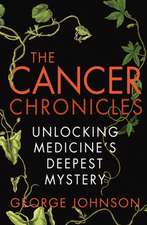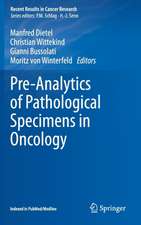New Trends in the Molecular and Biological Basis for Clinical Oncology
Editat de Tetsuhiko Tachikawa, Nose Kiyoshi, Tohru Ohmori, Mitsuru Adachien Limba Engleză Hardback – 22 dec 2008
| Toate formatele și edițiile | Preț | Express |
|---|---|---|
| Paperback (1) | 711.52 lei 6-8 săpt. | |
| Springer – 20 oct 2010 | 711.52 lei 6-8 săpt. | |
| Hardback (1) | 717.20 lei 6-8 săpt. | |
| Springer – 22 dec 2008 | 717.20 lei 6-8 săpt. |
Preț: 717.20 lei
Preț vechi: 754.95 lei
-5% Nou
Puncte Express: 1076
Preț estimativ în valută:
137.23€ • 143.30$ • 113.32£
137.23€ • 143.30$ • 113.32£
Carte tipărită la comandă
Livrare economică 15-29 aprilie
Preluare comenzi: 021 569.72.76
Specificații
ISBN-13: 9784431886624
ISBN-10: 4431886621
Pagini: 216
Ilustrații: XVIII, 192 p.
Dimensiuni: 155 x 235 x 18 mm
Greutate: 0.45 kg
Ediția:2009
Editura: Springer
Colecția Springer
Locul publicării:Tokyo, Japan
ISBN-10: 4431886621
Pagini: 216
Ilustrații: XVIII, 192 p.
Dimensiuni: 155 x 235 x 18 mm
Greutate: 0.45 kg
Ediția:2009
Editura: Springer
Colecția Springer
Locul publicării:Tokyo, Japan
Public țintă
ResearchDescriere
Newly developed molecular target anticancer drugs have shown remarkable efficacy even in the treatment of intractable cancers such as hepatoma and renal cell carcinoma. As cancer research is becoming a multidisciplinary endeavor, close cooperation across the basic, translational, and clinical research fields holds the promise of further advances in cancer therapeutics. This book sets forth new strategies for development: cancer therapy targeting receptor tyrosine kinases with clinical utilization of new signaling regulations; interaction between cancer progression and extracellular environments such as inflammatory cytokines and the extracellular matrix; and investigation of biomarkers for personalized cancer therapy, with microarray analysis and pharmacogenomics technology. These and other findings from the latest investigations into cancer cell biology and therapeutics make this book an invaluable source for investigators in both the clinical and basic cancer research fields.
Cuprins
Part I RTK Related Signaling HER2 Overexpression Attenuates the Antiproliferative Effect of Aromatase Inhibitor in MCF-7 Breast Cancer Cells Stably Expressing AromataseBiomarker Research for Development of Molecular Target AgentsEpidermal Growth Factor (EGF) Receptor Kinase Activity is Required for Tumor Necrosis Factor (TNF)-alpha Mediated Intestinal Epithelial SurvivalA Molecular Mechanism of Diminished Binding Activity between 15 bp Deletion Mutant EGFR and c-Cbl Ubiquitin LigasePart II Inflammation, Angiogenesis & Tumor Progression TGFbeta-mediated Epithelial Mesenchymal Transition and Metastasis in Skin and Head-and-Neck Cancer TGF-beta and Tumor Progression Mediated by Reactive Oxygen Species Role of MT1-MMP in Tumor-stromal Interaction Role of Proinflammatory Prostaglandin E2 in Bladder Tumor Progression Part III Biomarkers for Clinical Oncology Molecular Biomarker for Lung Cancer Screening of Biomarker for Oral Squamous Cell Carcinoma Correlating with Clinicopathological Findings Using by Laser Microdissection and cDNA Microarray Biomarkers for clinical oncology Genome-wide cDNA microarray screening of gene expression profiles correlated with resistance to anti-cancer drug treatment and radiation in oral squamous cell carcinoma Part IV Poster Session Drug Accumulation and Efflux Do not Contribute to Acquired Gefitinib Resistance Difference of EGFR-Binding Proteins between Wild Type and Mutant EGFR Competitive Nuclear Export of Cyclin D1 and Hic-5 Regulates Anchorage-dependence of Cell Growth and Survival Induction of Matrix Metalloprotease Gene Expression in an Endothelial Cell Line by Direct Interaction with Malignant Cells Experession of Rad21 Creaved Products in Oral Epithelium Telomerase-Specific Replication-Selective Virotherapy for Oral Squamous Cell Carcinoma Cell Lines Hypoxia Induces Resistance to 5-Fluorouracil in Oral Cancer Cells via G1 Phase Cell Cycle Arrest










